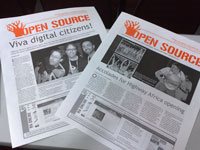It's Highway Africa time again and the little, old, and serene town of Grahamstown, 131km from Port-Elizabeth in the Eastern Cape, has been ‘invaded' by more than 700 media practitioners from more than 40 African countries and other parts of the world, meeting here to discuss the burning issue of citizen journalism in today's fast-changing media environment. The conference opened today, Monday, 8 September 2008, at Rhodes University and will end on Wednesday.

Powered by Nokia
Research (mapping the terrain of the challenges of technology and media), education and training (skills capacitation, responding to the gaps identified in the research), information and plenary sessions (flagship of the event) are the programmes areas of Highway Africa, director Chris Kabwato told the audience in his opening remarks.
Kabwato added: “To do quality journalism in a rapidly changing world, we need the tools that enable us to respond with speed and precision. Digital technologies, including the demystification of the Internet, give us an opportunity to do just that - to access a virtual library at the touch of a button, to send a story in the wink of the eye.”
Prof Guy Berger, head of Rhodes University's School of Journalism said: “We should not just think that those who exercise citizen journalism are not qualified journalists, but we must also consider all journalists as citizens.”

Powered by Nokia
“You are all here citizens of the Republic of Highway Africa, which is a vast network and a rich generator called ‘social capital'. This phrase means more than that every stakeholder puts in, the more everyone gets out. So, be sure to invest in meeting as many others as possible while you are here, share the lessons of your experience and training and inject your views into the debates.”
Diversity of views
While the rise of citizen journalism has been lauded as ‘the other way' of promoting the diversity of views in the world constantly dominated by media owners and producers who pull the strings to enrich themselves while overlooking the concept of objectivity and human dignity, Dr Saleem Badat, Rhodes University vice-chancellor, said that citizen journalism, if unchecked, can also pose a danger to society.

Powered by Nokia
“Citizen journalism can also be a vehicle of promoting fundamental ideology based on xenophobia, racism, sexism, genocide, ethnic cleansing and all sorts of human rights abuse,” Dr Badat said, citing examples of massacres of Rwanda, Kosovo, Palestine and other abuses.
Cheriff Sy, from Burkina Faso, said that there must be a strict distinction between a trained journalist and a citizen journalist because not all citizens are journalists - journalism is a respectable profession that has principles, dogmas and limitations. “Otherwise, we will close all universities, schools of journalism and media studies and that will spell the end of journalism.
“Unlike those bloggers who put whatever comes in their minds into the net, a journalist is a responsible citizen who is bound by strict practices, including objectivity, respect for human dignity and human rights.”
For daily conference highlights, latest news, podcasts, pictures, video and audio, go to http://highwayafrica.com. Also go to www.zoopy.com/bizcommunity.
For more:
























































